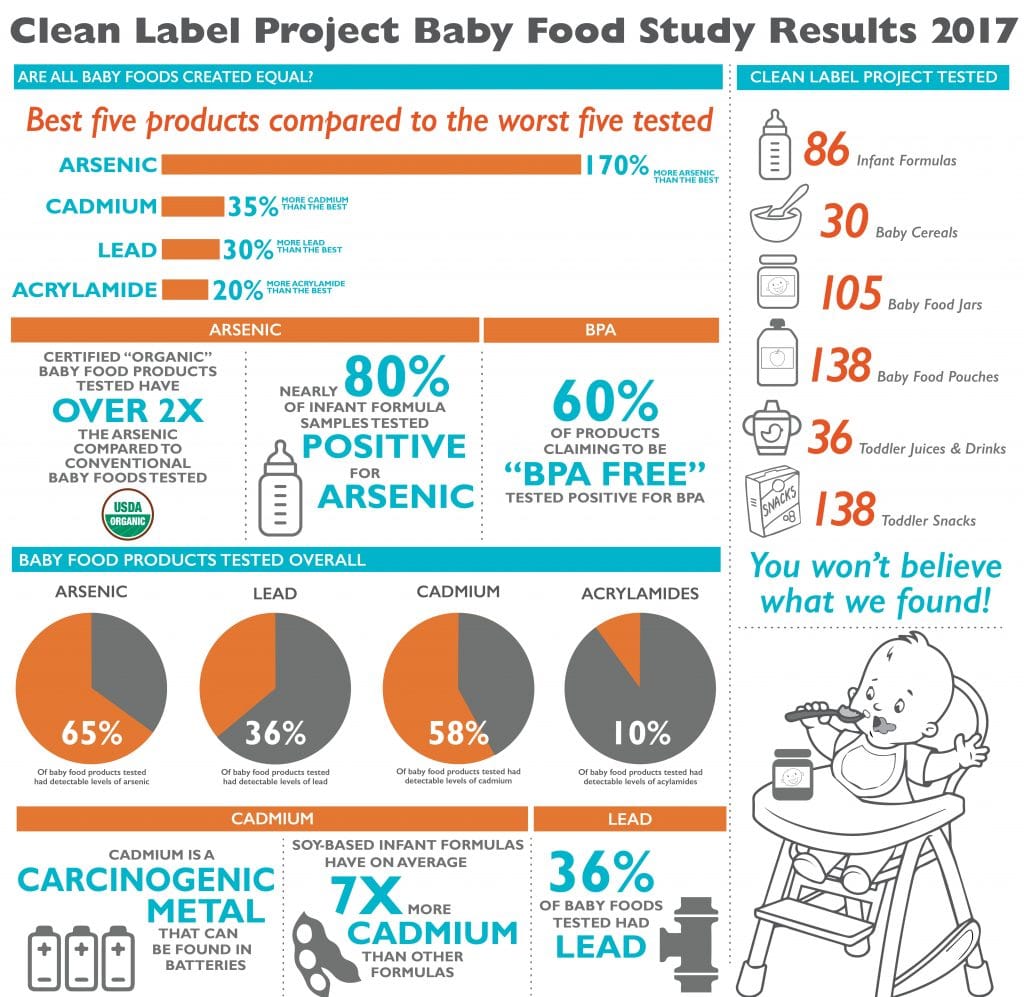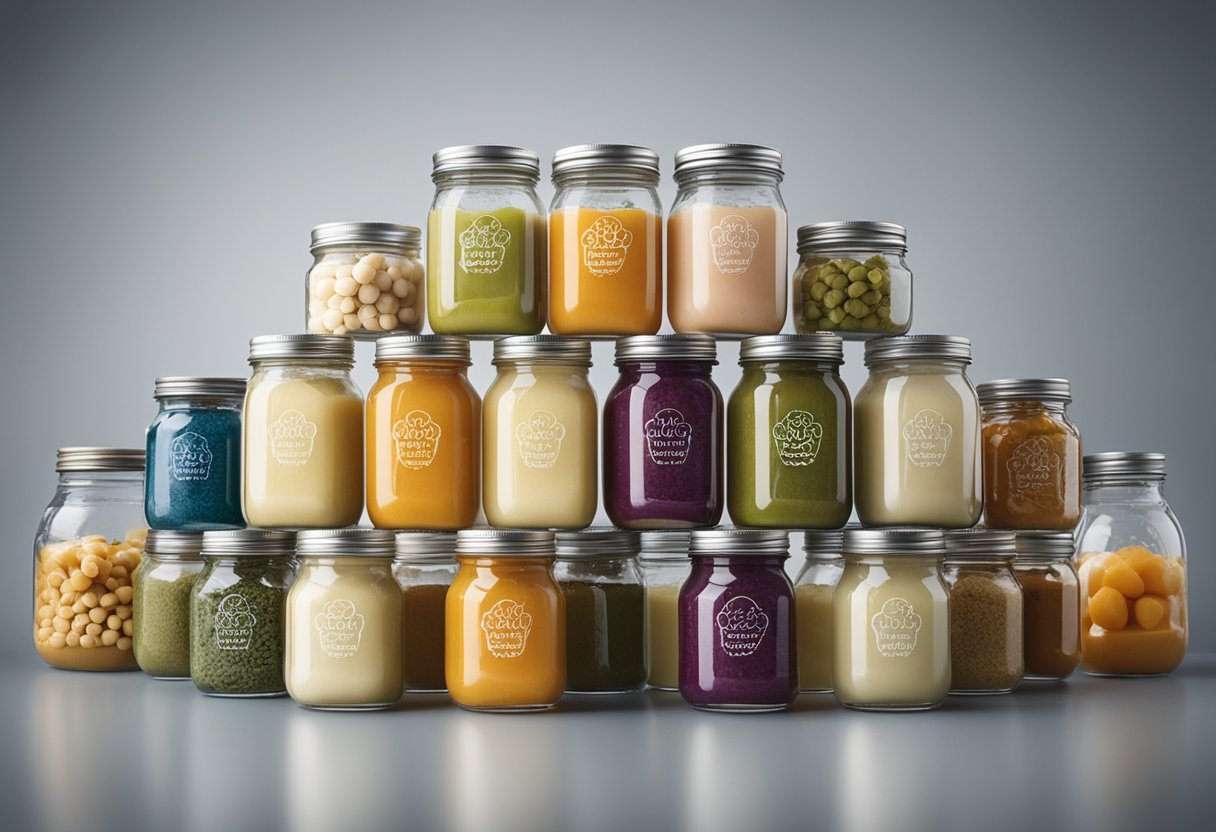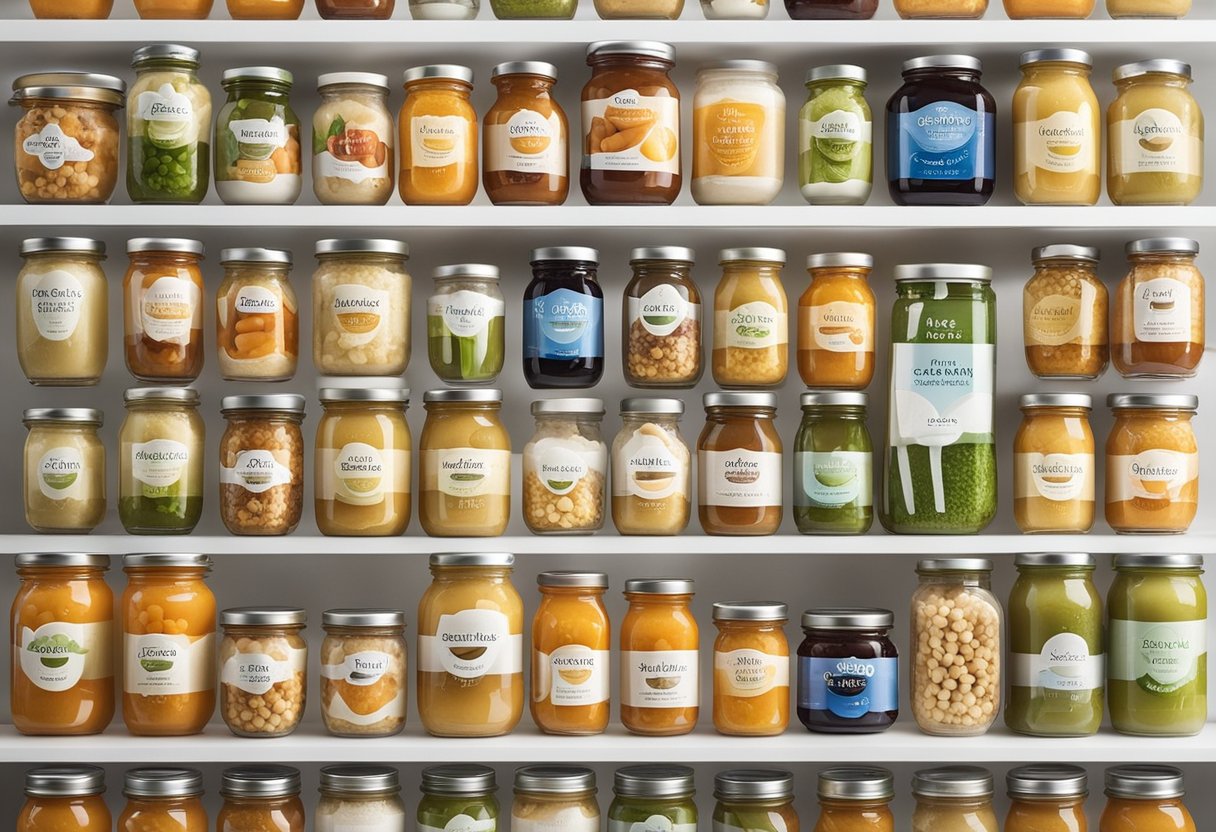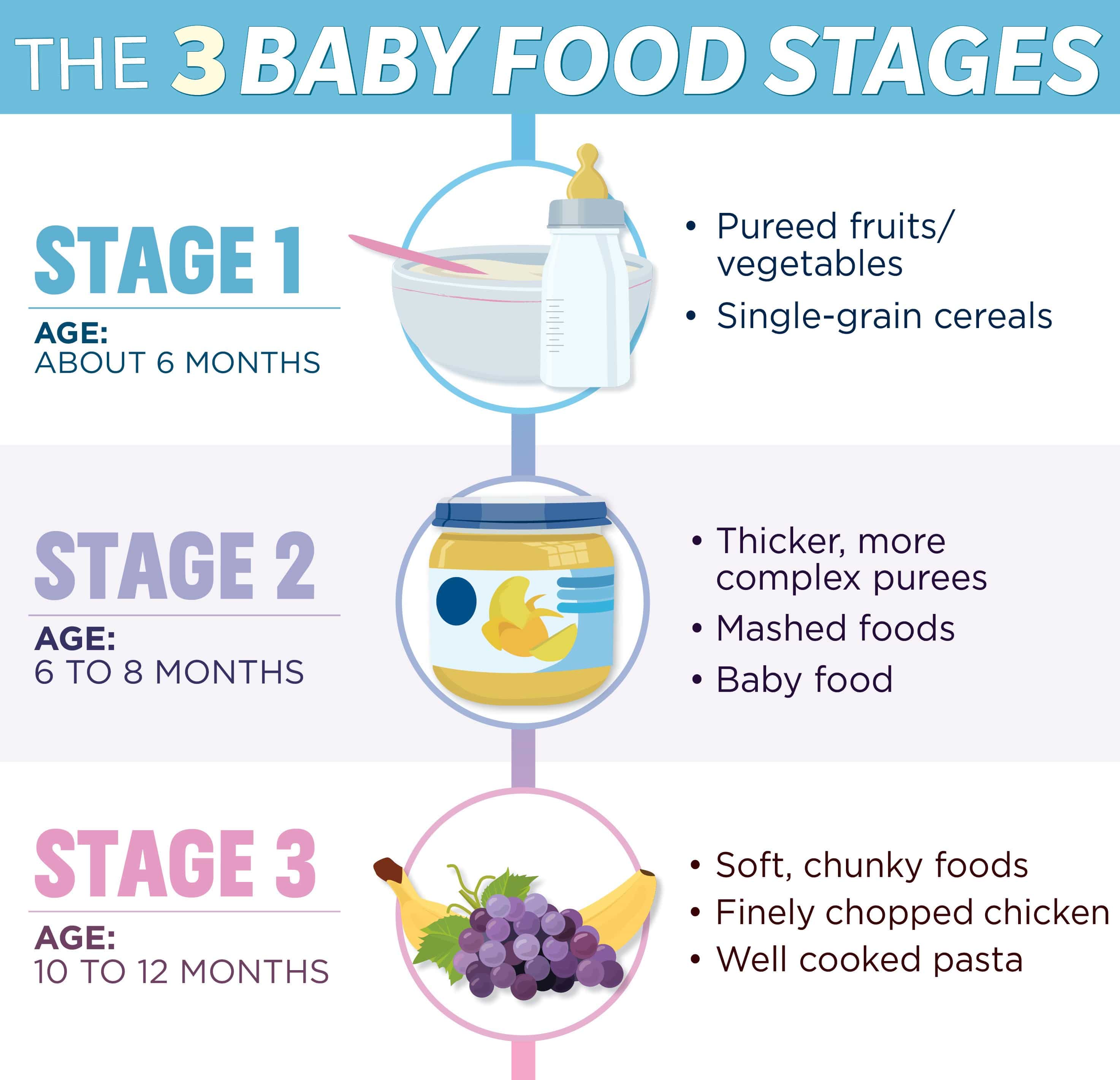List of the Best Baby Foods: Top Picks for Your Little One’s Nutritious Meals
Many parents are faced with the challenge of introducing solid foods to their babies, and choosing the right baby food can be overwhelming. With so many options available, it can be difficult to know which products are the best for your little one. This article will provide a comprehensive list of the best baby foods on the market, as well as information on how to choose the right foods for your baby’s nutritional needs.
Understanding baby nutrition is crucial for ensuring your baby is getting the right nutrients for healthy growth and development. Starting solids at the right time and in the right way is also important, as it can impact your baby’s eating habits later in life. This article will cover everything you need to know about baby nutrition and starting solids, from types of baby foods to feeding safety and precautions. Whether you’re a first-time parent or experienced caregiver, this resource will provide valuable information to help you make informed decisions about your baby’s diet.
Key Takeaways
- Choosing the right baby food can be overwhelming, but understanding baby nutrition and starting solids at the right time and in the right way can help ensure your baby gets the nutrients they need for healthy growth and development.
- There are many types of baby foods available, including commercial brands and homemade options. Understanding food labels and feeding safety and precautions is important for choosing the best products for your baby.
- Convenient baby food options can make feeding easier, but it’s important to choose products that are healthy and meet your baby’s nutritional needs.
Understanding Baby Nutrition
Babies require proper nutrition to support their growth and development. Understanding baby nutrition is crucial for parents to ensure that their little ones are getting the right nutrients they need.
Nutrition is the study of how food affects the body. Babies require a balanced diet that provides them with all the essential nutrients they need. These nutrients include protein, fat, fiber, vitamins, zinc, potassium, and calcium.
Protein is essential for building and repairing tissues in the body. Infants require adequate protein to support their rapid growth and development. Breast milk and formula provide the necessary protein for infants.
Fat is another important nutrient for babies. It provides energy and helps in the development of the brain and nervous system. Breast milk and formula provide the necessary fat for infants.
Fiber is not a nutrient that babies require in large amounts. However, it is essential for maintaining healthy digestion. As babies grow older and start eating solid foods, they can get fiber from fruits, vegetables, and whole grains.
Vitamins are essential for the proper functioning of the body. Breast milk and formula provide infants with all the necessary vitamins. As babies grow older and start eating solid foods, they can get vitamins from fruits, vegetables, and other foods.
Zinc is a mineral that is essential for the proper functioning of the immune system and for the growth and development of the body. Breast milk and formula provide infants with all the necessary zinc.
Potassium is a mineral that is essential for maintaining healthy blood pressure and for the proper functioning of the heart and other organs. Breast milk and formula provide infants with all the necessary potassium.
Calcium is a mineral that is essential for the development of strong bones and teeth. Breast milk and formula provide infants with all the necessary calcium.
In summary, understanding baby nutrition is crucial for parents to ensure that their little ones are getting the right nutrients they need. A balanced diet that provides infants with all the essential nutrients, including protein, fat, fiber, vitamins, zinc, potassium, and calcium, is necessary for their growth and development.
Starting Solids: When and How
Introducing solid foods is an important milestone in a baby’s life. It’s essential to do it at the right time and in the right way to ensure the baby’s health and development. Here are some guidelines to help parents get started:
When to Start
Pediatricians recommend starting solids when babies are between four and six months old. However, every baby is different, and parents should look for signs that their baby is ready. These signs include:
- Being able to sit up with support
- Showing interest in food
- Being able to hold their head up and turn it from side to side
- Losing the tongue-thrust reflex (pushing food out of the mouth with the tongue)
Age-Appropriate Foods
When starting solids, it’s important to choose age-appropriate foods. Babies’ digestive systems are still developing, and some foods can be difficult to digest. It’s best to start with single-ingredient foods, such as rice cereal, pureed fruits and vegetables, and pureed meats. Once the baby has tried these foods and is comfortable with them, parents can start to introduce more complex foods.
Spoon-Feeding vs. Baby-Led Weaning
There are two approaches to introducing solid foods: spoon-feeding and baby-led weaning. Spoon-feeding involves feeding the baby pureed foods with a spoon. Baby-led weaning involves allowing the baby to feed themselves with finger foods. Both approaches have their pros and cons, and parents should choose the one that works best for their family.
Conclusion
Starting solids is an exciting time for parents and babies alike. By following these guidelines and consulting with a pediatrician, parents can ensure that their baby is getting the nutrition they need to grow and develop.
Types of Baby Foods
When it comes to feeding a baby, parents have a variety of options to choose from. Here are some of the most common types of baby foods:
Cereals
Cereals are a popular first food for babies. They are easy to digest and fortified with essential nutrients like iron. Rice cereal is a common choice, but parents can also choose oatmeal or barley cereal.
Vegetables
Vegetables are a great source of vitamins and minerals for babies. Common vegetable purees include sweet potatoes, carrots, and peas. These can be easily prepared at home or purchased pre-made in jars or pouches.
Meat
Meat is an important source of protein and iron for babies. Pureed chicken and beef are popular choices, but parents can also choose lamb or turkey. It is important to make sure the meat is well-cooked and pureed to a smooth consistency.
Fruits
Fruits are a great way to introduce babies to new flavors and textures. Common fruit purees include apples, bananas, and pears. Parents can also choose more exotic fruits like mango or papaya.
Yogurt
Yogurt is a good source of calcium and protein for babies. Plain, unsweetened yogurt is the best choice, as it does not contain added sugars. Parents can mix in pureed fruit or cereal to make it more palatable.
Purees
Purees are a convenient way to feed babies on the go. They come in a variety of flavors and can be easily stored in a diaper bag. Parents should look for purees that are free from added sugars and preservatives.
Avocado
Avocado is a nutrient-dense food that is high in healthy fats. It can be mashed or pureed and served as a standalone food or mixed with other purees.
Sweet Potatoes
Sweet potatoes are a good source of vitamins A and C. They have a naturally sweet taste that babies tend to enjoy.
Carrots
Carrots are a good source of beta-carotene, which is important for healthy vision. They can be pureed and served alone or mixed with other purees.
Peas
Peas are a good source of protein and fiber. They can be pureed and served alone or mixed with other purees.
Fish
Fish is a good source of omega-3 fatty acids, which are important for brain development. Parents can choose salmon, cod, or other mild white fish. It is important to make sure the fish is well-cooked and pureed to a smooth consistency.
Grains
Grains like quinoa and brown rice are good sources of fiber and protein. They can be pureed and served alone or mixed with other purees.
Eggs
Eggs are a good source of protein and iron. They can be scrambled and mashed or pureed with other foods.
Pumpkin
Pumpkin is a good source of vitamins A and C. It can be pureed and served alone or mixed with other purees.
Overall, parents should aim to offer a variety of foods to their babies to ensure they are getting all the nutrients they need for healthy growth and development.
Commercial Baby Food Brands
There are a variety of commercial baby food brands on the market that parents can choose from. These brands offer a convenient and easy way to provide babies with the nutrients they need to grow and develop.
One of the most well-known baby food brands is Gerber. Gerber has been around for over 90 years and offers a wide range of baby food products, including purees, snacks, and meals. Gerber’s products are made with high-quality ingredients and are designed to meet the nutritional needs of babies at different stages of development.
Another popular baby food brand is Little Spoon. Little Spoon offers fresh, organic baby food that is delivered straight to your door. Their products are made with whole, organic ingredients and are free from preservatives, additives, and artificial flavors.
Once Upon a Farm is another organic baby food brand that offers a variety of purees and snacks. Their products are made with organic fruits and vegetables and are cold-pressed to retain nutrients and flavor.
Beech-Nut is a baby food brand that prides itself on using real ingredients. Their products are made with non-GMO fruits and vegetables and are free from artificial preservatives, colors, and flavors.
Cerebelly is a baby food brand that focuses on brain development. Their products are designed to provide babies with the nutrients they need to support healthy brain development. Cerebelly’s products are made with organic ingredients and are free from artificial colors, flavors, and preservatives.
Overall, there are many commercial baby food brands to choose from, each with their own unique offerings and benefits. Parents should do their research and choose a brand that aligns with their values and meets their baby’s nutritional needs.
Homemade vs. Store-Bought Baby Food
When it comes to feeding babies, parents have two options: homemade or store-bought baby food. Both have their advantages and disadvantages, and it ultimately comes down to personal preference.
One advantage of homemade baby food is that parents have complete control over what goes into their baby’s food. They can choose organic or non-GMO ingredients and avoid preservatives. Additionally, homemade baby food can be made with fresh ingredients, providing babies with more nutrients and flavor. However, making homemade baby food can be time-consuming and may require special equipment, such as a blender or food processor.
On the other hand, store-bought baby food is convenient and can be a time-saver for busy parents. Many brands offer organic and non-GMO options, and the USDA regulates baby food to ensure safety and quality. However, store-bought baby food may contain preservatives and may not be as fresh as homemade baby food.
Overall, both homemade and store-bought baby food can be healthy options for babies. It’s important to read labels and choose the best baby food for your baby’s needs. Parents should also consult with their pediatrician before introducing new foods to their baby’s diet.
Understanding Food Labels
When it comes to feeding babies, understanding food labels can be a daunting task. However, it is essential to know what is in the food you are giving to your little one. Here are some things to consider when reading food labels:
Ingredients
The ingredient list is a crucial part of food labels. It outlines the components used to make the food. It is essential to look for foods with simple and natural ingredients. Avoid foods with long lists of ingredients that contain additives, preservatives, and artificial colors.
Added Sugar
Added sugar is a common ingredient in many baby foods. It is essential to avoid foods with added sugar, as it can lead to obesity and other health problems. Look for foods with no added sugar or low amounts of added sugar.
Salt
Salt is another ingredient that is commonly added to baby foods. Too much salt can harm your baby’s kidneys and lead to high blood pressure. Look for foods with low sodium content.
Labels
Labels such as “organic,” “non-GMO,” and “gluten-free” can be helpful in selecting baby foods. However, it is essential to read the ingredient list and nutrition facts to ensure that the food meets your baby’s needs.
Arsenic
Arsenic is a toxic substance that can be found in some baby foods, particularly those made with rice. It is crucial to avoid foods with high levels of arsenic.
BPA-Free
Bisphenol-A (BPA) is a chemical commonly found in plastics. It is essential to choose baby foods that are BPA-free to avoid exposure to this harmful chemical.
Heavy Metals
Heavy metals such as lead, cadmium, and mercury can be found in some baby foods. It is essential to choose foods with low levels of heavy metals to avoid health problems.
Contaminants
Contaminants such as bacteria and mold can be present in some baby foods. It is crucial to choose foods with a good safety record and to follow proper storage and handling guidelines.
Allergenic Foods
Some baby foods contain allergenic foods such as peanuts, tree nuts, and dairy. It is essential to read the ingredient list carefully and avoid foods that your baby is allergic to.
Whole Grain
Whole grains are an essential part of a healthy diet. Look for baby foods that contain whole grains such as brown rice, quinoa, and oats.
In summary, understanding food labels is crucial when feeding babies. By reading ingredient lists, avoiding added sugar and salt, and choosing foods with low levels of contaminants and heavy metals, you can ensure that your baby is eating healthy and nutritious food.
Feeding Safety and Precautions
When it comes to feeding babies, safety is of the utmost importance. Parents should always follow proper feeding practices to ensure their baby’s health and well-being. The American Academy of Pediatrics (AAP) recommends exclusive breastfeeding for the first six months of a baby’s life, followed by the introduction of solid foods while continuing to breastfeed until at least 12 months of age.
Parents who choose to use formula should follow the instructions carefully and ensure that it is prepared with clean hands and equipment. It is important to note that breast milk is the best source of nutrition for babies, and formula should only be used if breastfeeding is not possible.
When introducing solid foods, parents should be aware of potential allergens, such as peanuts, tree nuts, eggs, and shellfish. These foods should be introduced one at a time and in small amounts to monitor for any allergic reactions. It is also important to avoid giving babies honey, as it can cause infant botulism.
Juice should be avoided for babies under the age of one, as it provides little nutritional value and can lead to tooth decay. Instead, babies should be offered water or breast milk/formula.
In summary, parents should follow the AAP’s guidelines for feeding their baby, including exclusive breastfeeding for the first six months and the introduction of solid foods while continuing to breastfeed until at least 12 months of age. They should also be aware of potential allergens and avoid giving babies honey and juice. By following these precautions, parents can ensure their baby’s safety and promote healthy growth and development.
The Role of Food in Baby’s Growth and Development
Proper nutrition plays a crucial role in a baby’s growth and development. The first few years of a child’s life are a critical time for brain development and overall growth. During this time, the baby’s brain is rapidly developing, and proper nutrition is essential to support this growth.
A balanced diet that includes a variety of nutrient-dense foods is crucial for a baby’s optimal growth and development. Nutrients such as protein, healthy fats, vitamins, and minerals are all essential for the baby’s overall health. It is essential to provide the baby with a variety of foods that contain these nutrients to ensure they are getting everything they need.
Research has shown that inadequate nutrition during early childhood can have long-term effects on a child’s cognitive development, which can lead to learning difficulties and poor academic performance. Therefore, it is essential to provide babies with a balanced diet that supports their brain development.
Moreover, providing babies with a balanced diet can also reduce the risk of chronic diseases later in life. A diet rich in fruits, vegetables, and whole grains can help reduce the risk of obesity, heart disease, and other chronic conditions.
In conclusion, proper nutrition is crucial for a baby’s growth and development. A balanced diet that includes nutrient-dense foods is essential for optimal brain development and overall health. Parents and caregivers should provide babies with a variety of foods to ensure they are getting everything they need to support their growth and development.
Convenient Baby Food Options
When it comes to feeding babies, convenience is key. Parents need quick and easy options that are also nutritious and tasty for their little ones. Here are some convenient baby food options that parents can consider:
Pouches
Baby food pouches have become increasingly popular in recent years due to their convenience. They are easy to store, transport, and serve. Many brands offer a variety of flavors and textures to suit different tastes and stages of development. However, some experts have raised concerns about the environmental impact of pouches and the potential for overconsumption.
Jars
Jars of baby food have been a staple for many years. They are widely available and come in a range of flavors and stages. Jars are also easy to store and serve, making them a convenient option for parents. However, some parents may find them less convenient than pouches due to the need for a spoon and the risk of spills.
Baby Food Subscription Services
Baby food subscription services offer a convenient way for parents to ensure their little ones have a steady supply of nutritious food. Many services offer customized plans based on the baby’s age and dietary needs. However, subscription services can be expensive and may not be accessible to all families.
Breastfeeding
Breastfeeding is the most natural and convenient way to feed a baby. Breast milk provides all the necessary nutrients for a baby’s growth and development, and it is always available and at the right temperature. However, not all mothers are able to breastfeed, and some may find it challenging or uncomfortable.
In conclusion, there are several convenient baby food options available for parents to choose from. Each option has its own advantages and disadvantages, and parents should choose the one that works best for their family’s needs and values.
Conclusion
In conclusion, choosing the best baby food for your little one can be a daunting task. With so many options available in the market, it is important to consider the nutritional value, ingredients, and taste of the food.
Parents should always read the labels carefully and avoid foods that contain added sugars, artificial colors, and flavors. It is also important to introduce a variety of foods to your baby to ensure they get all the necessary nutrients for healthy growth and development.
Some of the best baby foods on the market include organic purees, homemade baby food, and baby-led weaning options. These foods provide a range of nutrients and flavors that are essential for your baby’s development.
Ultimately, the best baby food for your little one will depend on their individual needs and preferences. By staying informed and making informed choices, parents can ensure that their babies receive the best possible nutrition for healthy growth and development.
Feeding Babies: Starting Solid Foods
Are you curious about when to introduce solid foods to your baby? We’re here to guide you through the initial stages of fostering a skilled eater. Discover the signals that indicate your baby is prepared for solid foods, explore various options for first foods and textures, and gain insights into recognizing when they’re hungry or satisfied.
Baby Food Stages
Understanding which foods your baby needs to consume can be overwhelming. To simplify things, here are some fundamental concepts about the three primary stages of baby food.
Source
Baby Food Study Results
Not every baby food is identical in quality. Read on to discover everything you need to know.















